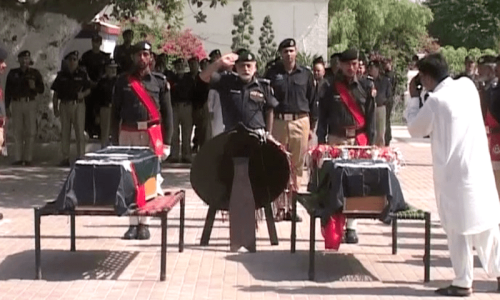WASHINGTON, Sept 21: The US General in charge of NATO in Afghanistan on Thursday said a peace deal between Pakistan and tribal elders could yet bring peace to restive border regions, despite being savaged by US critics.
General James Jones, the supreme commander of allied forces in Europe, warned his men were closely watching results of the controversial pact in Waziristan and he would return to Islamabad in 30 days to discuss its impact.
He also reported that NATO’s appeal for member states to fully meet troop and equipment pledges was bearing fruit, as it tries to bolster alliance forces facing stronger-than-expected resistance from suspected Taliban militants.
The tribal deal has been slammed by some analysts and US observers of Afghanistan, who fear Pakistan’s government gave too much ground and worry militants will find easier refuge in border regions.
“If all of the words (in the agreement) are backed up, then we should see a positive development,” Jones told the Senate Foreign Relations Committee.
“If they are able to live up to the terms of these agreements the border should be a much quieter area.”
“This is measurable, because we can tell what is going on in the borders,” Jones said, adding he would return to Pakistan next month for high-level talks with Pakistani commanders.
But several US senators slammed the deal, ahead of talks on Friday between President George W. Bush and Pakistan’s President Pervez Musharraf.
Defeated 2004 Democratic nominee John Kerry said it was troubling, and noted many observers had expectations of the deal “considerably lower” than those of Jones.
The committee’s top Democrat Joseph Biden warned in a statement that much of Afghanistan was ungovernable thanks to the Taliban resurgence, and claimed the militia was attacking NATO troops from its safe havens in Pakistan.
“They can do that because the government of Pakistan turns a blind eye to the Taliban high command based in Quetta, and just this month signed a ‘separate peace’ with pro-Taliban militias in Waziristan.” The accord signed September 5 calls for the expulsion of foreign Al-Qaeda fighters from tribal areas bordering Afghanistan.—AFP














































Dear visitor, the comments section is undergoing an overhaul and will return soon.